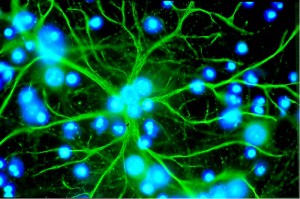Boston researchers at Tufts University have discovered that astrocytes (star-shaped neurons) and adenosine (a neurotransmitter) could mediate the link between sleep deprivation and mood improvements in depressed patients.
It has been known since the 1970s that acute sleep deprivation is almost immediately effective in reducing symptoms for 60% of patients with major depressive disorders. However, this is clearly not a long-term solution since it can be unpleasant for the patient and effects are short-lived. Researchers are looking to create drugs that can mimic the reduction; to do this, a better understanding of sleep deprivation’s effects is required.
The study, published in Translational Psychiatry, looked at glial cells (neurons’ partner cells) called astrocytes. Phil Haydon and his group at Tufts University have previously shown that astrocytes modulate effects of sleep deprivation via neuronal regulation. Specifically, they affect adenosine receptors on neuronal membranes. Adenosine is a neurotransmitter that appears to induce sleep; coffee keeps you awake because caffeine inhibits adenosine receptors, which halts the neurotransmitter’s sleep promoting effects.
The researchers administered an adenosine receptor agonist in order to mimic the effects of sleep deprivation in mice. This did not stop overnight sleep, but meant that adenosine levels were not reduced as they would normally be in the morning. The abundance of sleep-promoting adenosine meant the mice suffered sleep deprivation. Twelve hours later the mice had reduced depressive symptoms, a result which persisted for 48 hours. “By manipulating astrocytes we were able to mimic the effects of sleep deprivation on depressive-like symptoms, causing a rapid and sustained improvement in behaviour,” said Dustin Hines, a researcher in the study.
Understanding how these receptors work could be a step towards developing effective anti-depressants that work quickly and effectively, especially for use in a psychiatric emergency. The next step is to investigate other receptors in this system to see if they may also have a similar effect.
Hines DJ, Schmitt LI, Hines RM, Moss SJ, Haydon PG. (2013) “Antidepressant effects of sleep deprivation require astrocyte-dependent adenosine mediated signaling.”Translational Psychiatry, 3, e212; doi:10.1038/tp.2012.136
